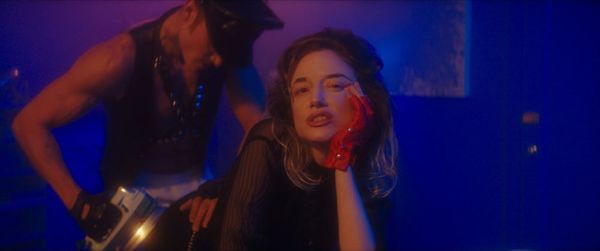Eye For Film >> Movies >> Please Baby Please (2022) Film Review
Please Baby Please
Reviewed by: Jennie Kermode

Fans of musicals will instantly connect with the opening of Please Baby Please, one of a pair of films by Amanda Kramer which screened at Fantasia 2022 and quickly secured distribution. It is, in context, a conventional opening, in which a gang of leather-clad tough guys wielding baseball bats and twirling chains emerge from an alleyway, striking dramatic poses along the way. At first they scuffle with one another in a highly structured, lightly eroticised dance. Then they break the rules, as such gangs are elsewhere supposed to, beating two passers-by to death just as another couple arrives on the scene.
This second pairing is Suse (Andrea Riseborough) and Arthur (Harry Melling). They freeze at the sight, uncertain what to do, but the Young Gents let them pass, more interested in taunting them than in initiating another attack, especially as they are right outside their home so now know where they live. It will not escape viewers’ attention that a significant amount of eye contact is made between Arthur and sultry, Brando-esque gang leader Teddy (Karl Glusman) during this encounter. The immediate threat is over, but something more insidious has entered the couple’s lives, and soon it will begin eating away at the fabric of their lives, at their very identities.
Played out in pink and blue apartments, embracing its theatricality, this playful exploration of masculinity takes in gender, sexuality and romance as Suze and Arthur, each propelled on a different journey, come apart and then gradually ease back together again, albeit in different forms. Why are they together? “Because we loe each other!” Arthur protests, precipitating laughter, yet the film feels like a tribute to love as a verb, to the process of rediscovery and invention which makes lasting relationships possible. This is a love which resurfaces at odd moments, when Arthur needs somebody to cling to, when Suse experiences a rush of jealousy. The only thing that is impossible to standing still.
“I ought to be famous but I’m just married,” says the couple’s wealthy upstairs neighbour, all leopard print coat and no patience. It’s a gem of a role for Demi Moore, who doesn’t get much screentime but dominates what she has. A kept woman with a string of lovers and a largely absent husband who keeps buying her kitchen goods when what she wants is attention, she awakens Suse to the possibility that her frustration with Arthur’s passivity in the face of the gang is indicative of something deeper. Soon Suse is begging Arthur to be rough with her, terrifying him with her ferocious topping from the bottom. Of course he can’t deliver, but perhaps it doesn’t matter. Suse’s masochistic urges persist, fulfilled perhaps in fantasy, perhaps in real life (it’s difficult to tell), but they are only an expression of something deeper, a frustration with the caution expected of women, an abiding need to transform into something else.
By contrast with this, Arthur’s journey may seem quite mundane. Riseborough is the one shouting for attention, splendidly furious. Melling approaches his role from a place of restraint, only gradually letting this vulnerable character expose himself to the world. Arthur doesn’t want to be a man on Suse’s terms. He doesn’t want to define himself through violence and competition. Yet as his masculinity comes under repeated attack, he becomes less interested in defending it, moving into a non-binary space. Though this may come across as yielding, it makes him a perpetually challenging character in a world which allows room for binary transition and for dykes and queens but still operates according to strictly Cartesian logic. Arthur’s queerness is something which he has to define for himself – at the same time as holding on to the marriage he still values and contending with the fact that the man he’s falling for is a murderer.
There are layers and layers of humour here, sometimes rooted in queer and theatrical traditions but mostly accessible regardless. Glusman lovingly mines every cliché as the boy from the wrong side of the tracks who fell in with a bad crowd but is essentially sweet and misunderstood – or so he will always claim. Riseborough goes through a striking physical transformation as Suse embraces her own masculinity, finding inner peace in the outward expression of rage. Kramer plays games with colour and light, self-conscious staging always reminding us of the artificiality of the thing, but the final scene, which makes artful use of split-screen, delivers a tableau in which everyone seems to have found their rightful place – at least for the duration of this dance.
Reviewed on: 25 Jul 2022
















